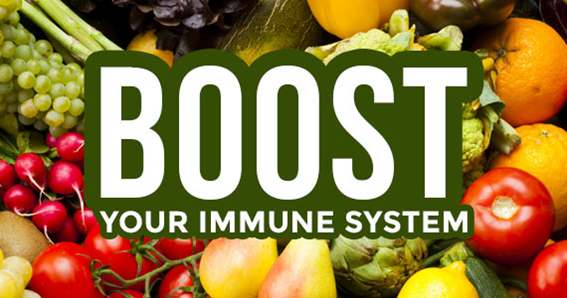7 Ways to Boost Your Immune System

As the COVID-19 pandemic numbers continues to rise, many of my friends and family have asked me how to increase their immunity and defense system against this virus. In addition to following the public health recommendations of social distancing, self-isolation and other mitigation strategies, there are some things you can do to help boost your immunity.
It is extremely important, now more than ever, to maximize your health and body’s ability to fight off infection in order to recover from COVID-19 if you are exposed to this pathogen.
So the question is….How can you improve your immune system?
Typically, your immune system does a extraordinary job of defending against disease.
But sometimes it fails…
What Can You Do to Boost Your Immune System?
In order for the immune system to function well, there must be a balance between stressors and lifestyle. While there are no “scientifically-proven” lifestyle modifications to enhance your immune system, these general healthy-living strategies are a good way to start.
Every part of your body, especially the immune system, functions better to attack environmental disease if you are living a healthy lifestyle.
Here are some ideas to increase your immune system
- Don’t smoke
- Exercise Regularly
- If you drink alcohol, drink in moderation
- Get adequate sleep
- Minimize Stress
- Eat a diet high in fruits and vegetables
- Practice to avoid infections –washing your hands regularly and cook meat thoroughly
Smoking

Smoking harms the immune system and can make the body less successful at fighting disease. The immune system is the body’s way of protecting itself from infection and disease; it works to fight everything from cold and flu viruses to serious conditions such as cancer.
This increases the risk for several immune and autoimmune disorders (conditions caused when the immune system mistakenly attacks the body’s healthy cells and tissues).
Exercise Regularly

Regular exercise is one of the mainstays of healthy living. It improves cardiovascular health, lowers blood pressure, helps control body weight, and protects against a variety of diseases.
But does it help to boost your immune system naturally and keep it healthy?
Just like a healthy diet, exercise can contribute to general good health and therefore to a healthy immune system. It may contribute even more directly by promoting good circulation, which allows the cells and substances of the immune system to move through the body freely and do their job efficiently.
Alcohol

Alcohol can affect your health in many different ways. Most people are aware that excessive drinking can damage your liver and cardiovascular system. It can also damage your digestive system, leading to malnutrition and even increasing your risk of cancer. Many people see these conditions as problems for the distant future.
You may be less aware that alcohol also damages your immune system, increasing your risk of potentially fatal illnesses such as pneumonia. There are a number of ways alcohol impairs your immune system, making you more likely to get sick.
First, it’s important to know that the microbes living in your intestines, your gut’s microbiome, plays an important role in fighting diseases. When you drink a lot of alcohol, it has many negative effects on your digestive system. It also severely disturbs your gut’s microbiome, significantly altering the balance of healthy and unhealthy bacteria.
Alcohol also affects the respiratory system. Excessive drinking may impair the function of immune cells in the lungs and upper respiratory system, leading to increased risk for pneumonia, tuberculosis, and acute respiratory distress syndrome, or ARDS. Because the immunity of the mucus is impaired in both the lungs and digestive tract, any disease can become more severe.
Sleep

Lack of sleep can affect your immune system. Studies show that people who don’t get quality sleep or enough sleep are more likely to get sick after being exposed to a virus, such as a common cold virus. Lack of sleep can also affect how fast you recover if you do get sick.
During sleep, your immune system releases proteins called cytokines, some of which help promote sleep. Certain cytokines need to increase when you have an infection or inflammation, or when you’re under stress. Sleep deprivation may decrease production of these protective cytokines. In addition, infection-fighting antibodies and cells are reduced during periods when you don’t get enough sleep.
How much sleep do you need to bolster your immune system?
The optimal amount of sleep for most adults is seven to eight hours of good sleep each night. Teenagers need nine to 10 hours of sleep. School-aged children may need 10 or more hours of sleep.
Stress

Modern medicine has come to appreciate the closely linked relationship of mind and body. Emotional stress can lead to a variety of illnesses including GI disturbances, hives and even heart disease.
Don’t lose your sense of humor in a crisis. Scientists suggest that laughter eally does reduce stress, which has a cascade of smaller, immune-system-friendly benefits.
Laughter varies your heart rate from fast to slow, which is good for you. And it helps your muscles relax.
Perhaps best of all, laughter and positivity can release stress-busting neuropeptides to counter the chemistry that negativity, stress and anxiety induce.
So yeah, this is a very challenging time. But appreciate its funny moments, too.
Meditation is being heralded worldwide for its mental health benefits, from lowering blood pressure and heart rate to perhaps improving memory and building the immune system. There are free and paid apps to help, and people can choose where and when to do it. Some people like music, some a mantra, others a voice guiding them.
Diet and Immunity

The immune system relies heavily and micro- and macro-nutrients. Healthy immune system cells need good, regular nourishment. Scientists have long recognized that people who live in poverty and are malnourished are more vulnerable to infectious diseases.
There is some evidence that various micronutrient deficiencies — for example, deficiencies of zinc, selenium, iron, copper, folic acid, and vitamins A, B6, C, and E — alter immune responses in animals, as measured in the test tube.
If you suspect your diet is not providing you with all your micronutrient needs — maybe, for instance, you don’t like vegetables — taking a daily multivitamin and mineral supplement may bring other health benefits, beyond any possibly beneficial effects on the immune system.
Singh Snapshot
As we age, our immune response capability becomes reduced, which in turn contributes to more infections and more cancer. While some people age healthily, compared with younger people, the elderly are more likely to contract infectious diseases and, even more importantly, more likely to die from them.
Keeping sending COVID-19 memes to your friends/family…laughter is good medicine!
Sleep enough but not too much!
Stop smoking and vaping…you know who you are!
Try to avoid the temptation to binge drink during these times of social distancing and self-isolation.
Find time for meditation, mindfulness and calmness throughout the day.



Leave a Reply